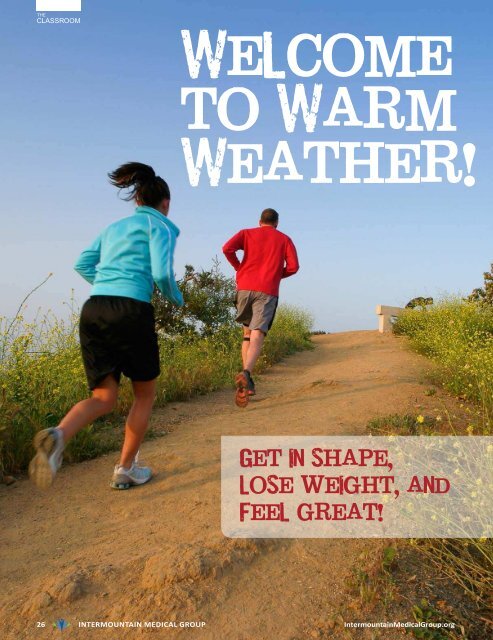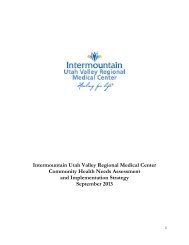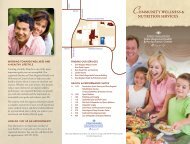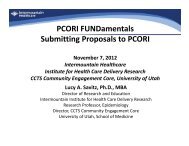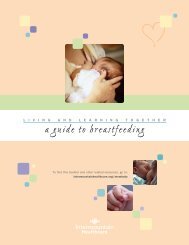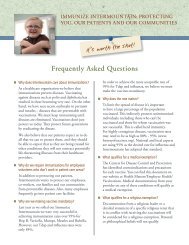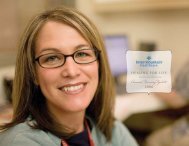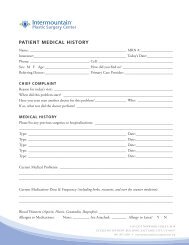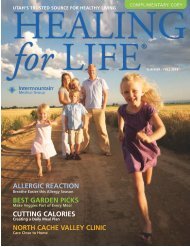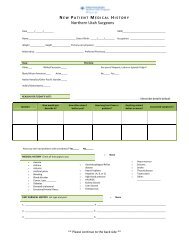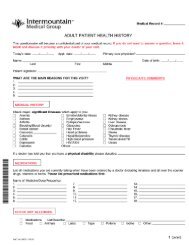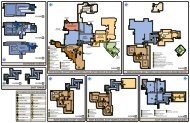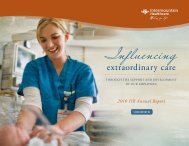permanent allergy relief? - Intermountain Healthcare
permanent allergy relief? - Intermountain Healthcare
permanent allergy relief? - Intermountain Healthcare
- No tags were found...
Create successful ePaper yourself
Turn your PDF publications into a flip-book with our unique Google optimized e-Paper software.
THECLASSROOMTHECLASSROOMTHECLASSROOMTHECLASSROOMWelcometo WarmTip: Start slowly, set reasonablegoals, train with someone who hasexperience or who can motivateyou, and have fun!Weather!Get in shape,lose weight, andfeel great!The spring and summer seasonsbring people outside to do lotsof wonderful things like biking,hiking, walking, swimming,golfing, playing in the parkand on and on.This is also the season to RUN! Running is one of the greatestways to get exercise, get in shape, lose weight, and feel great!The great runner Jesse Owens once said, “I always lovedrunning...it was something you could do by yourself, andunder your own power. You could go in any direction, fastor slow as you wanted, fighting the wind if you felt like it,seeking out new sights just on the strength of your feet andthe courage of your lungs.”While running has many advantages, it also presents manyopportunities for injury. The doctors of <strong>Intermountain</strong> SportsMedicine Specialty Group work hard to help you get backto the action after you get injured, but we also work to helpprevent those injuries in the first place.We are now offering a special running clinic called TheRunning Lab. It focuses on preventing running-relatedinjuries by assessing three general areas: (1) runningmechanics, (2) lactate threshold, and (3) strength andflexibility. Here is a sneak peak at what we offer and somebasic tips on how to prevent common running injuries.Running MechanicsIn this assessment, we look closely at your feet and runningstyle by exam and a slow-motion video system. We work tohelp you avoid common injuries like Achilles tendonitis orITB syndrome by improving how your foot hits the ground,correcting problems with form, and helping you chooseproper shoes (or no shoes for you barefoot enthusiasts!).Tip: Increasing your cadence (the number of times your feethit the ground in one minute) by 10 percent up to 180 footsteps per minute will help decrease a significant number ofrunning injuries.Lactate ThresholdHere we will measure your blood lactate level while you run.When lactate rises, you get tired and can’t keep running. Withthis information, we can help you learn how to train smarter,longer, and more efficiently. Tip: A good training plan useslong and short runs, strengthening exercises, and even crosstraining to improve your ability to use oxygen and hold offthe rise of lactate in your blood. This results in longer andfaster running. We’ll also teach you how to manage eating anddrinking while you train to fuel up and stay healthy.Tip: Carbo-loading ideally takes a week-not just one big pastameal the night before a race.Strength and FlexibilityMuscle strength is very important for runners, starting withthe core muscles (muscles of the trunk, back, pelvis, andupper legs). We’ll assess your strength and give you exercisesto correct weakness. Tip: Some people are strong but“functionally” weak, meaning that when they try to move orrun, their muscles don’t work together very well. We teachfunctional strength and movement exercises to improve howsmoothly you run, so that you use less energy and avoid injury.We hope these assessments will keep you away from injury andout of our offices. We love to get people running.Tip: Start slowly, set reasonable goals, train with someone whohas experience or who can motivate you, and have fun! Ifyou’re already a runner, we want to keep you running. Tip: Ifyour running is growing stale, try running on trails, train for arace, choose a different distance, or try a triathlon.Enjoy the warm weather, and we’ll see you on the roads, thetrails, and the finish lines!To make an appointment with a sports medicine physiciannear you, we invite you to visit the index at the back of thispublication or intermountainmedicalgroup.org.Spencer E. Richards, MDSports Medicine, Sports Injury<strong>Intermountain</strong> Sports MedicineSpecialty Group801.298.2495sportsmedgroup.orgfacebook.com/sportsmedgroup26 INTERMOUNTAIN MEDICAL GROUP <strong>Intermountain</strong>MedicalGroup.org SPRING/SUMMER 2011 27


